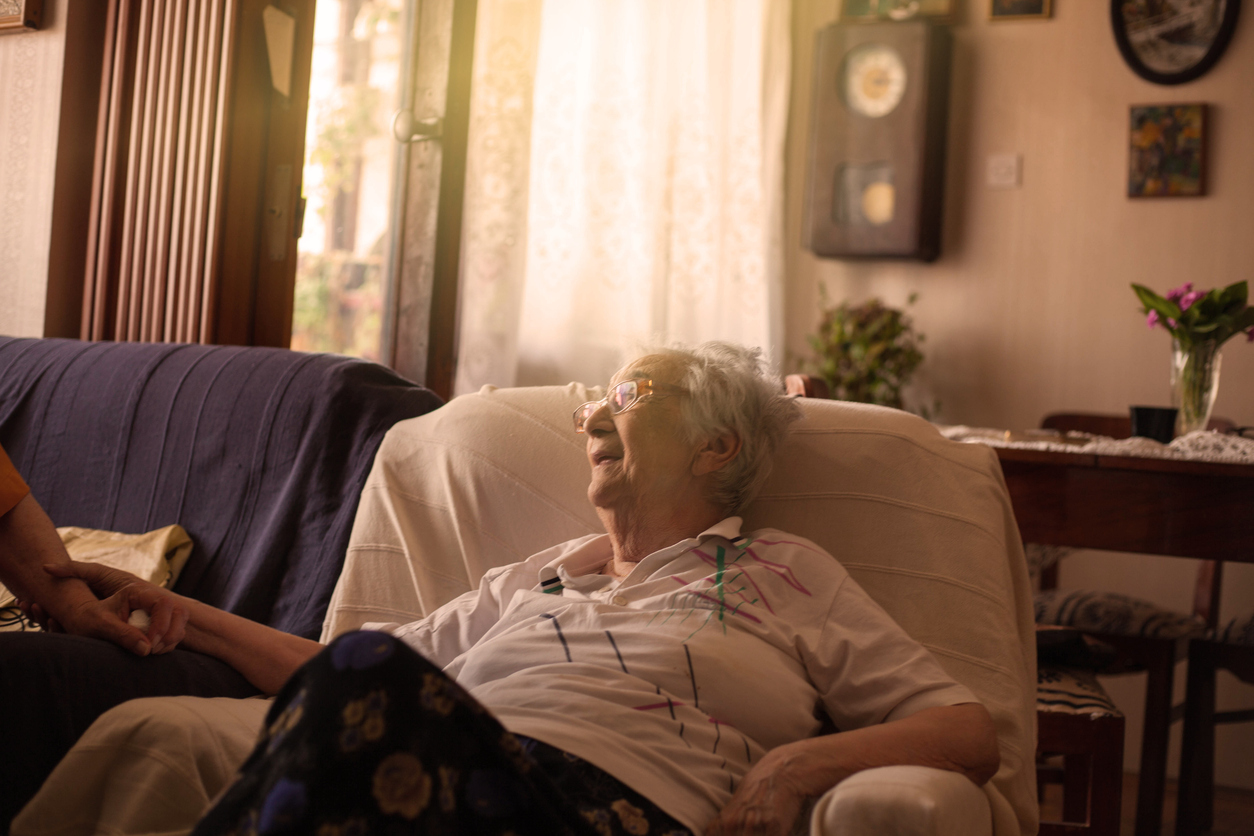The late afternoon can be tough when you’re caring for someone with dementia. Maybe your loved one becomes restless or confused. Maybe their mood changes. Maybe they seem like they’re searching for something, and you’re not sure how to help.
This shift is called sundowning. While it’s a common part of the dementia journey, it can also be confusing and emotionally exhausting.
HopeHealth’s community nurse educator, Lisa Wasson, RN, CHPN, CMDCP, explains why sundowning happens — and what helps.
> Connect with HopeHealth Circle of Love dementia care
What is sundowning?
For people living with dementia, sundowning refers to a cluster of behaviors — often challenging ones — that tend to surface in the late afternoon or evening.
It doesn’t look the same way in every person. It might show up as:
- Anxiety
- Confusion
- Anger or agitation
- Repetitive behaviors, from wandering to pacing to asking the same question again and again
Lisa recalls one woman in memory care who, around the same time each afternoon, would grow anxious and repeatedly ask about her daughter. What helped most was giving her consistent, gentle reassurance.
“The answer wouldn’t stick. But every time we responded, it calmed her nervous system a little bit,” Lisa says.
> Read: Support for the dementia journey: 4 programs for patients and caregivers
Why it happens
In simplest terms, sundowning is a sign of mental fatigue.
Over the course of a day, our brains constantly take in sights, sounds, decisions, transitions and social cues. Most people don’t think twice about it. But for someone living with dementia, even a routine day demands significant cognitive effort.
“From the moment they wake up, their brain is working overtime,” Lisa explains. “Every task takes more energy — getting dressed, eating, moving between rooms.”
By mid-to-late afternoon, a person with dementia has often reached a point of cognitive overload.
“Think about how most of us feel by 3 p.m. — we reach for a snack or scroll on our phones,” Lisa says. “We take a break. But people with dementia don’t always have those tools to self-soothe.”
Enter: sundowning, when your loved one may become restless, emotional or repetitive. These behaviors often serve as an attempt to release stress. Sometimes, they’re a clue about some unmet need.
“The person with dementia might not be able to say, ‘I need quiet’ or ‘I’m thirsty’ or ‘I need the restroom,’” Lisa says. “But their behavior is telling us something. We have to be a detective.”
> Read: 5 stages of dementia: What to expect & how to connect
What helps: Tips for dementia caregivers
You may not be able to eliminate sundowning completely. But small changes in your approach can ease its intensity.
1. Build in brain breaks.
Try to create moments during the day when your loved one can simply be. Turn off the TV. Skip the multitasking. Offer a warm blanket and sit quietly. Even 15–30 minutes of quiet stillness can give the brain a reset and reduce late-day overwhelm.
“Rest is an important activity for someone living with dementia — and ‘rest’ doesn’t just mean sleep,” Lisa says. It means lowering mental demands.
2. Soften the environment.
As the day goes on, take note of sensory inputs. Is the lighting too harsh? Is the volume on the TV or radio too loud? Are there too many people talking at once?
Simple shifts — softer lights, quieter music, or a cozy corner with familiar objects — can go a long way in calming the nervous system.
3. Respond with compassion, not correction.
When someone is sundowning, it’s easy to feel helpless, especially if their behaviors are intense or emotional. Remember: They’re not trying to be difficult. They’re trying to cope.
“They’re doing their best with what their brain can still manage,” Lisa says.
Compassion is far more effective than correction. If they ask a question repeatedly, try to respond with patience. If they insist on leaving, offer reassurance instead of arguing. Even if they don’t register your words, your calm tone often gets through.
Final thoughts: Focus on safety, not solutions
Sundowning can be one of the toughest parts of dementia care. Understanding what’s going on beneath the surface can help you meet your loved one with empathy, and hopefully make afternoons and evenings easier for everyone.
“Try to remember: The person living with dementia doesn’t need you to fix everything,” Lisa says. “They just need to feel safe.”

